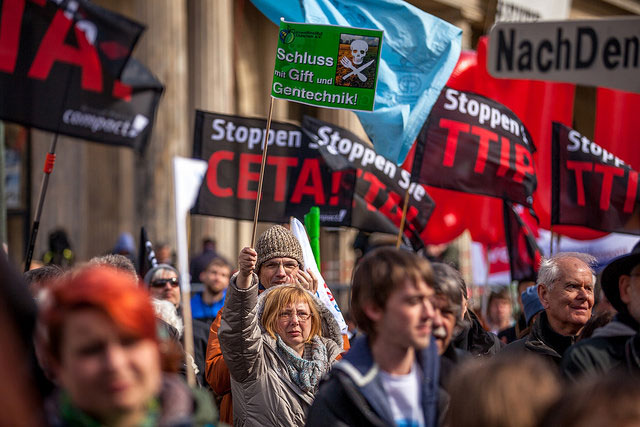
Honest, paywall-free news is rare. Please support our boldly independent journalism with a donation of any size.
The eleventh-hour passage of the Comprehensive Economic Trade Agreement (CETA) between Canada and the European Union marked a point of considerable contention on the Old Continent. Protesters from both sides of the Atlantic criticized the pact, citing unnerving similarities with NAFTA and TTIP, and decrying the series of new regulations that could do more lasting harm than good to the citizens and workforce of both continents. But to understand the true extent of the agreement’s consequences, we must look at the political and financial context that brought it into being in the first place.
An Argument for CETA
CETA is a Free Trade Agreement (FTA) meant to facilitate the import and export of labor and goods between the E.U. and Canada, allowing both economies to gain easier access to services, products and a wider consumer base. According to a statement made in December 2015 by European Trade Commissioner Cecilia Malmström, CETA is “a highly ambitious agreement [that] does more to remove barriers to economic opportunity for European workers, consumers and entrepreneurs than any other E.U. free trade agreement so far. Not only on tariff removal but also on public procurement, services or geographical indications.”
The Canadian government heralds the pact, saying it will allow the creation of a sustainable cooperative model between the E.U. and Canada. Meanwhile, E.U. officials claim CETA will benefit small and medium enterprises (SMEs) with over 500 million euros in reduced costs by cutting down tariffs.
CETA is expected to be ratified soon, based on an existing framework of trade deals between the E.U. and Canada that have been in place since the 1970s. Supporters say its implementation will help inject a steady stream of capital and create thousands of jobs in both economies. Yet a closer look into the specifics of the agreement conjures up eerie similarities to NAFTA and its economic fallout, alarming many people at a time when global trade deals face unprecedented scrutiny.
The Hidden Cost of “Free Trade”
One of the driving arguments for CETA is that it will enable European firms to be more “competitive” in the Canadian market. If that sounds familiar to the promises made about NAFTA in 1994, it’s because it is. That deal, which allowed the free import of goods into the United States and Canada from Mexico, caused the collapse of manufacturing jobs across the U.S. and Canada from 2000 to 2007, not to mention extreme economic hardship in certain sectors (like maize growing industry) in Mexico.
It’s important to note about CETA that the term “European firms” excludes small and medium sized enterprises from the equation. Instead, CETA is tailored to suit the needs of corporate lobbies by removing the limitations of privatization through “negative listing”. This means that “all services, except the ones listed, are subject to liberalization … [which] dramatically expands the scope of trade agreements since governments are agreeing to liberalize sectors that do not yet exist.”
Perhaps most important, CETA will allow for the implementation of a score of new bureaucratic regulatory bodies, headed by investor state dispute settlement (ISDS) tribunals. As followers of the anti-TTP and -TTIP protests are well aware, ISDS enable corporate courts, operating outside the legal framework of any country, to preside over cases where companies sue governments for damages they claim were incurred by any legislation that hurt their potential profit.
Critics argue that the establishment of this “parallel legal universe” for investors will create a dangerous precedent within the E.U., whose governments have already taken considerable liberties curtailing workers’ rights in a continued attempt to pull themselves out of their economic mire.
EU’s Scramble for the Bottom
The E.U.’s immediate economic forecast looks bleak. Unemployment rates remain largely unchanged across the board, with projected growth gradually slowing down across the member states — despite considerable predictions to the opposite effect earlier in 2016. By all accounts it has been a harsh year for the Union, with its foreign policy on the ropes and the Eurozone in shambles. Many feel this has led the body to make short-sighted strategic decisions: Since political leaders appear incapable of solving the economic crises in their respective countries, they have chosen CETA as an attractive, necessary evil, pinning their hopes on the promise that it will generate new sources of employment and produce lucrative results for the governments involved.
Interestingly, in Belgium, the Wallonia region’s initial refusal to back CETA, and its demand for a renegotiation of terms, forced the E.U. to account for a clause that will allow national and regional parliaments to veto ISDS involvement, provided it is voted in by the remaining 27 E.U. countries.
Many see this as a necessary change to the original clauses contained in CETA. As Deutsche Welle reported, in a statement from Germany’s anti-CETA group More Democracy, ISDS means that “through their Canadian subsidiaries, 40,000 U.S. companies can sue the European Union, and all member states down to small towns.” Whatever the eventual outcome, it appears CETA will serve in the least as a gateway to the renegotiation of TTIP, the E.U.-U.S. deal that was shot down earlier this year — but which many on the continent fear will be re-christened and re-branded after the U.S. election.
Press freedom is under attack
As Trump cracks down on political speech, independent media is increasingly necessary.
Truthout produces reporting you won’t see in the mainstream: journalism from the frontlines of global conflict, interviews with grassroots movement leaders, high-quality legal analysis and more.
Our work is possible thanks to reader support. Help Truthout catalyze change and social justice — make a tax-deductible monthly or one-time donation today.